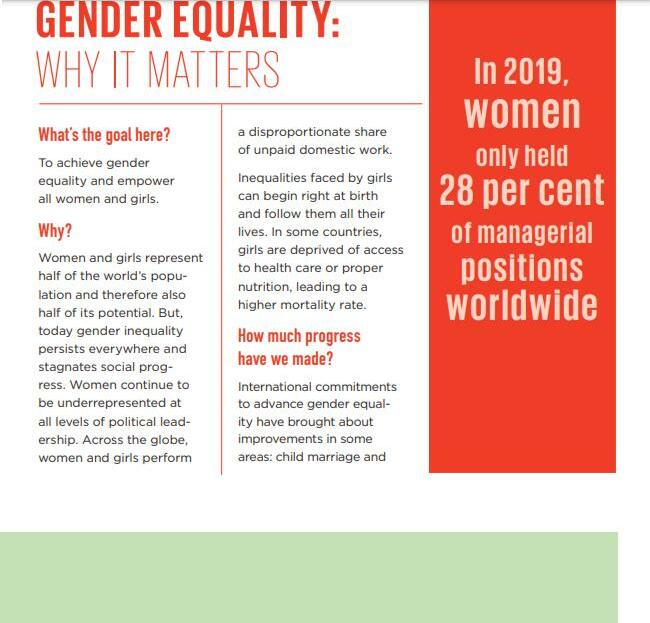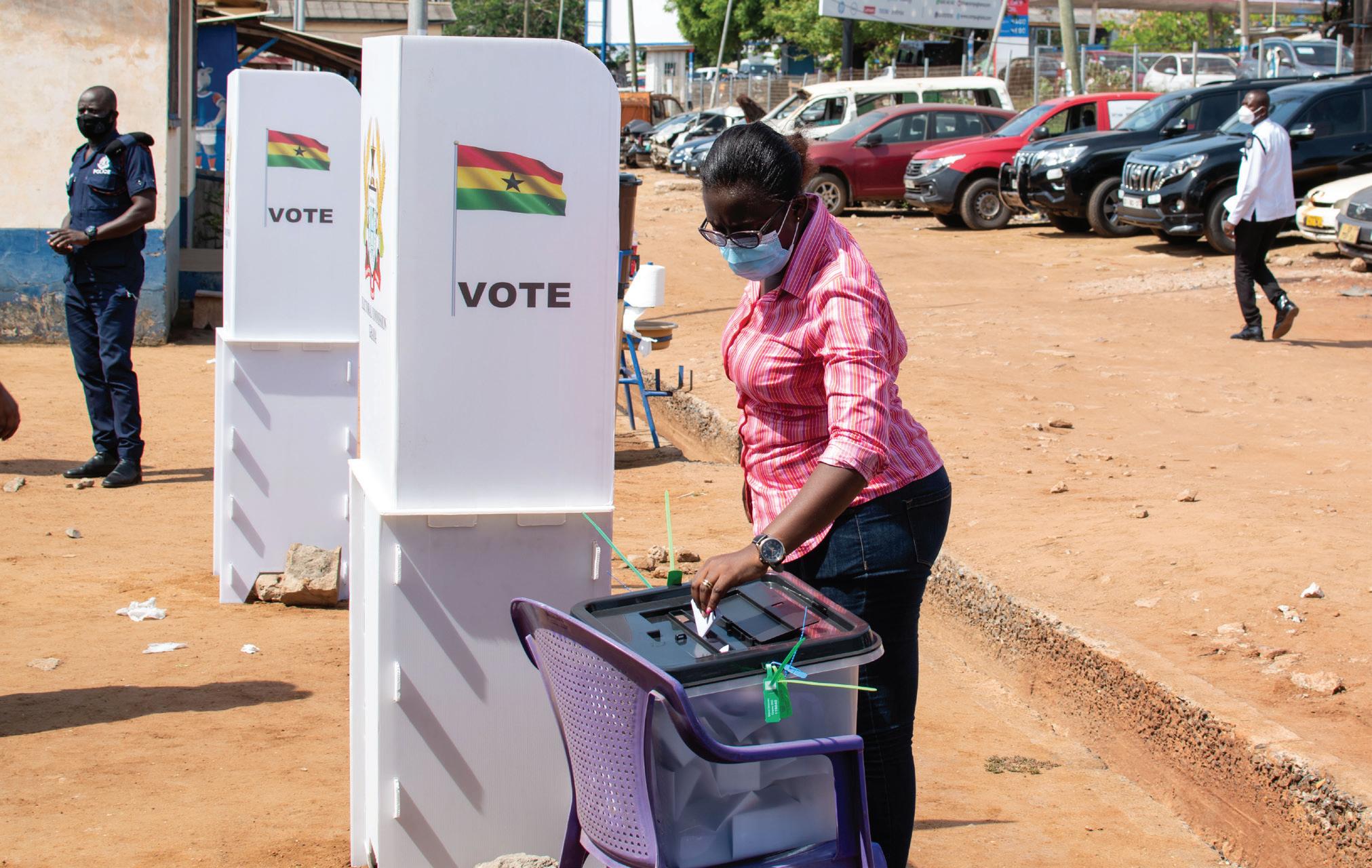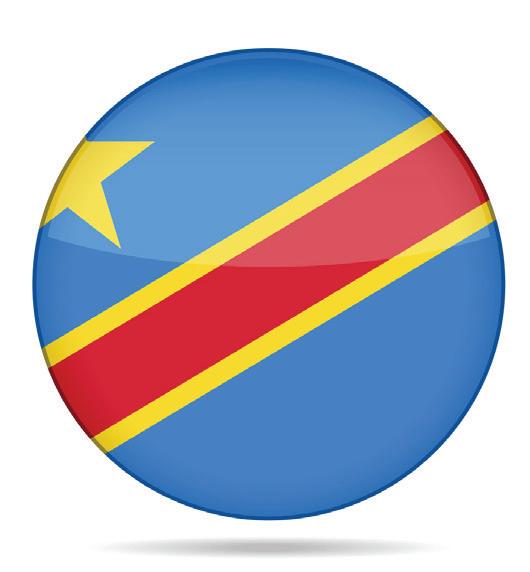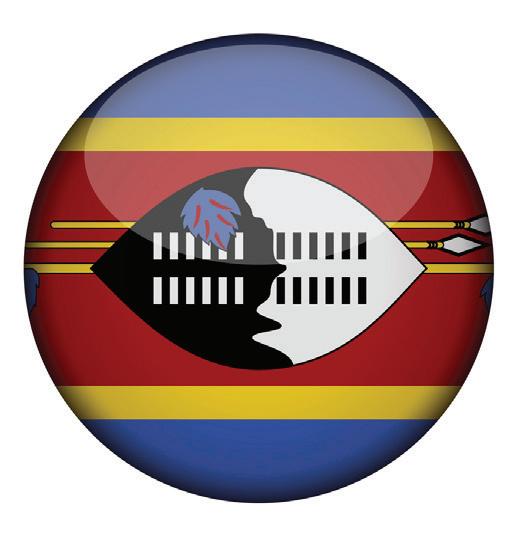
7 minute read
B. Proportional Representation
(f) Ensure universal access to sexual and reproductive health and reproductive rights as agreed in accordance with the Programme of Action of the International Conference on Population and Development and the Beijing Platform for Action and the outcome documents of their review conferences;
(g) Undertake reforms to give women equal rights to economic resources, as well as access to ownership and control over land and other forms of property, financial services, inheritance and natural resources, in accordance with national laws;
(h) Enhance the use of enabling technology, in particular information and communications technology, to promote the empowerment of women;
(i) Adopt and strengthen sound policies and enforceable legislation for the promotion of gender equality and the empowerment of all women and girls at all levels.
ILO CONVENTION 190: CONCERNING THE ELIMINATION OF VIOLENCE AND HARASSMENT IN THE WORLD OF WORK
The General Conference of the International Labour Organisation, having been convened at Geneva by the Governing Body of the International Labour Office, and having met in its 108th (Centenary) Session on 10 June 2019, and Recalling that the Declaration of Philadelphia affirms that all human beings, irrespective of race, creed or sex, have the right to pursue both their material well-being and their spiritual development in conditions of freedom and dignity, of economic security and equal opportunity.
Definitions
Article 1 1. For the purposes of this Convention:
(a) The term “violence and harassment” in the world of work refers to a range of unacceptable behaviours and practices, or threats thereof, whether a single occurrence or repeated, that aim at, result in, or are likely to result in physical, psychological, sexual or economic harm, and includes gender-based violence and harassment;
(b) the term “gender-based violence and harassment” means violence and harassment directed at persons because of their sex or gender, or affecting persons of a particular sex or gender disproportionately, and includes sexual harassment.

Male employee behaving inappropriately towards female colleague - an example of sexual harassment
This convention protects workers and other persons in the world of work, including employees as defined by national law and practice, as well as persons working irrespective of their contractual status, persons in training, including interns and apprentices, workers whose employment has been terminated, volunteers, jobseekers and job applicants, and individuals exercising the authority, duties or responsibilities of an employer.
This convention applies to all sectors, whether private or public, both in the formal and informal economy, and whether in urban or rural areas.
Article 3
This convention applies to violence and harassment in the world of work occurring in the course of, linked with or arising out of work:
(a) In the workplace, including public and private spaces where they are a place of work;
(b) In places where the worker is paid, takes a rest break or a meal, or uses sanitary, washing and changing facilities;
(c) During work-related trips, travel, training, events or social activities; (e) through workrelated communications, including those enabled by information and communication technologies;
(f) In employer-provided accommodation; and when commuting to and from work.
Core principles
Article 4 Each member shall adopt, in accordance with national law and circumstances and in consultation with representative employers’ and workers’ organisations, an inclusive, integrated and gender-responsive approach for the prevention and elimination of violence and harassment in the world of work. Such an approach should take into account violence and harassment involving third parties, where applicable, and includes: prohibiting in law violence and harassment.
African Union Agenda 2063
Aspiration 6:
(a) An Africa whose development is peopledriven, relying on the potential of African people, especially its women and youth, and caring for children.
(b) Strengthening the role of Africa’s women by ensuring gender equality and parity in all spheres of life (political, economic and social).
(c) Eliminating all forms of discrimination and violence against women and girls; creating opportunities for Africa’s youth for selfrealisation, access to health, education and jobs.
(d) Ensuring safety and security for Africa’s children, as well as providing for early childhood development.
Goal 17: Full Gender Equality in All Spheres of Life Priority Areas:
• Women and girls empowerment • Violence & discrimination against women and girls
Each member state that ratifies this Convention shall respect, promote and realize the right of everyone to a work environment free from violence and harassment.
Objectives:
After completion of this activity, the participants will be able to: • Understand the articles that point out the rights of women in African countries.
Time Needed 30 Minutes
Methodology Facilitator presentation and group discussion
Materials Flipchart, markers and paper

ACCRA, GHANA – December 1, 2020: A woman votes during Ghana’s 2020 election.
ARTICLE 8
State Parties shall eliminate all forms of discrimination, especially those based on political opinion, gender, ethnic, religious and racial grounds as well as any other form of intolerance.
State Parties shall adopt legislative and administrative measures to guarantee the rights of women, ethnic minorities, migrants, people with disabilities, refugees and displaced persons and other marginalized and vulnerable social groups.
ARTICLE 29
ARTICLE 43
State Parties shall recognize the crucial role of women in the development and strengthening of democracy.
State Parties shall create the necessary conditions for full and active participation of women in the decision-making processes and structures at all levels as a fundamental element in the promotion and exercise of a democratic culture.
State Parties shall take all possible measures to encourage the full and active participation of women in the electoral process and ensure gender parity in representation at all levels, including legislatures.
State Parties shall endeavour to provide free and compulsory basic education to all, especially girls, rural inhabitants, minorities, people with disabilities and other marginalized social groups.
In addition, State Parties shall ensure the literacy of citizens above compulsory school age, particularly women and rural inhabitants.
Activity 8: Case of some African constitutions
Objectives:
After completion of this activity, the participants will be able to: • Know what African countries adopted in their constitutions especially in countries concerned by this training.
Time Needed 30 Minutes
Methodology
Materials Facilitator presentation and group discussion
Flipchart, markers and paper
Sample Constitutions

Botswana The constitution of Botswana makes no provision for quotas to ensure women’s representation in publicly elected bodies on any level. The language of the constitution is masculine. For instance, Article 4(1) asserts that, “No person shall be deprived of his life intentionally save in execution of the sentence of a court in respect of an offence under the law in force in Botswana of which he has been convicted” Thus the word “he” appears in the text more than 150 times and the word “she” not once. The word “women” is utterly absent and only once does it appear that a Batswana might be other than male, for it provides that: “every person in Botswana is entitled to the fundamental rights and freedoms of the individual, that is to say, the right, whatever his race, place of origin, political opinions, colour, creed or sex...”

Democratic Republic of Congo
Article 14 The public authorities appreciate the elimination of all forms of discrimination against women and ensure the protection and promotion of their rights. They take in all areas, and most notably in the civil, political, economic, social and cultural areas, all appropriate measures to ensure the full realisation of the potential of women and their full participation in the development of the nation.
They take measures to fight all forms of violence against women in their public and private life. Women are entitled to equitable representation in national, provincial and local institutions. The State guarantees the achievement of parity between men and women in said institutions. The law determines the conditions for the application of these rights.

Constitution of Eswatini part 1(b)
Right to representation (article 84) Subject to the provisions of this Constitution, the people of Swaziland have a right to be heard through and represented by their own freely chosen representatives in the government of the country.
Without derogating from the generality of the foregoing subsection, the women of Swaziland and other marginalized groups have a right to equitable representation in Parliament and other public structures.
Representation of women (article 86) Where at the first meeting of the house after any general election it appears that female members of parliament will not constitute at least thirty per centum of the total membership of parliament, then, and only then, the provisions of this section shall apply.
For the purposes of this section, the house shall form itself into an electoral college and elect not more than four women on a regional basis to the house in accordance with the provisions of section 95(3).







